Students who have already completed Class 11 and 12 (or equivalent) or those awaiting results can apply.
Registration charge is Rs. 1,000/-.
Payment accepted via Khalti or
eSewa.
Online payments must be done using this
form only not via separate apps.
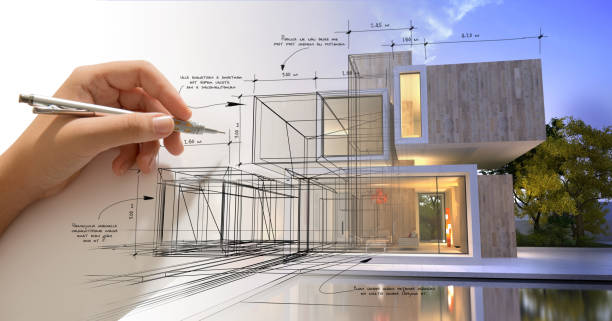
A five-year program focused on planning, design, and conservation of built environments with aesthetics, sustainability, and comfort.
Seats: 48
Morning Program
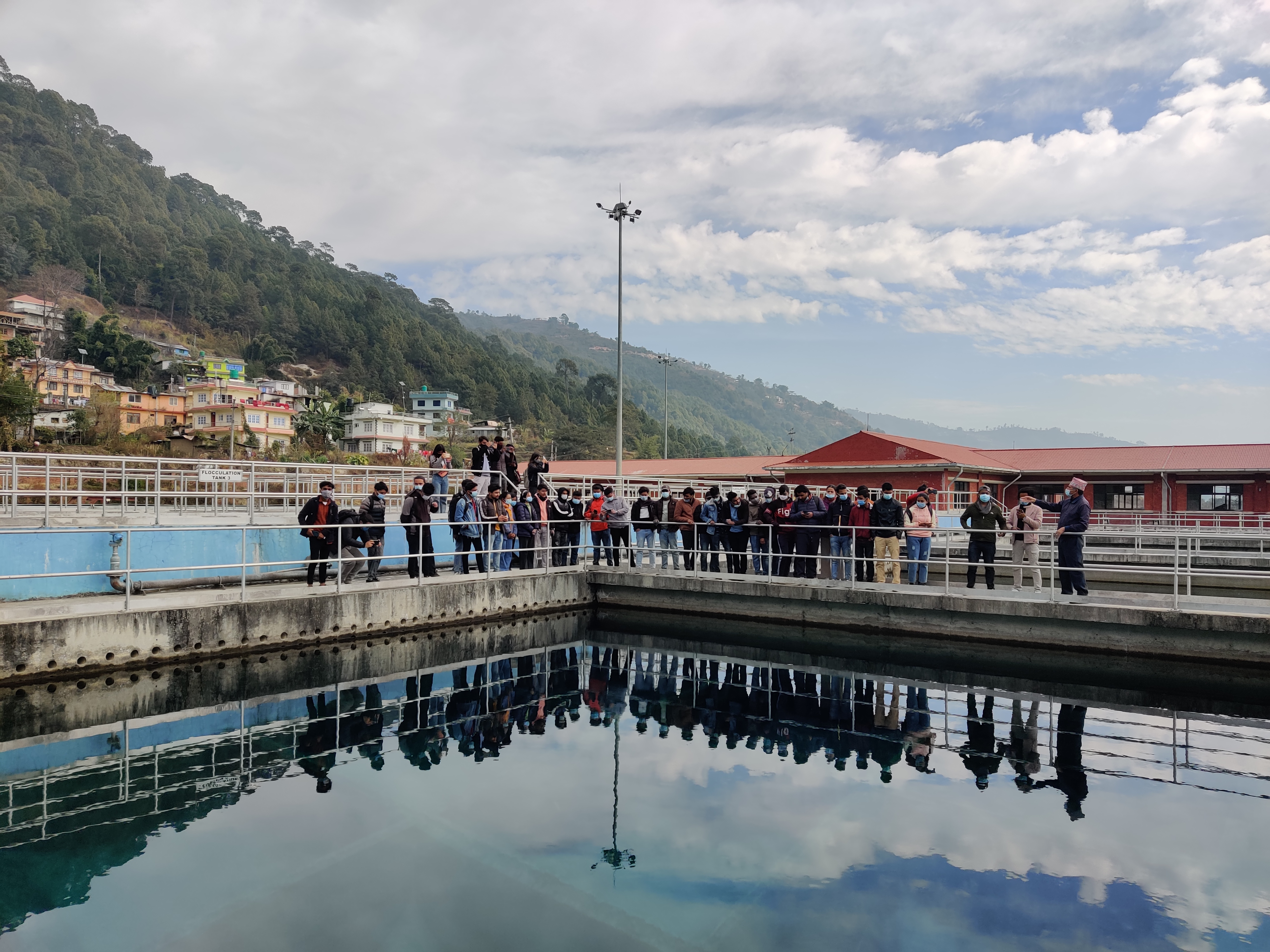
Designed to train engineers in infrastructure development, covering structures, water, transportation, environment, and surveying.
Seats: 144
Morning Program
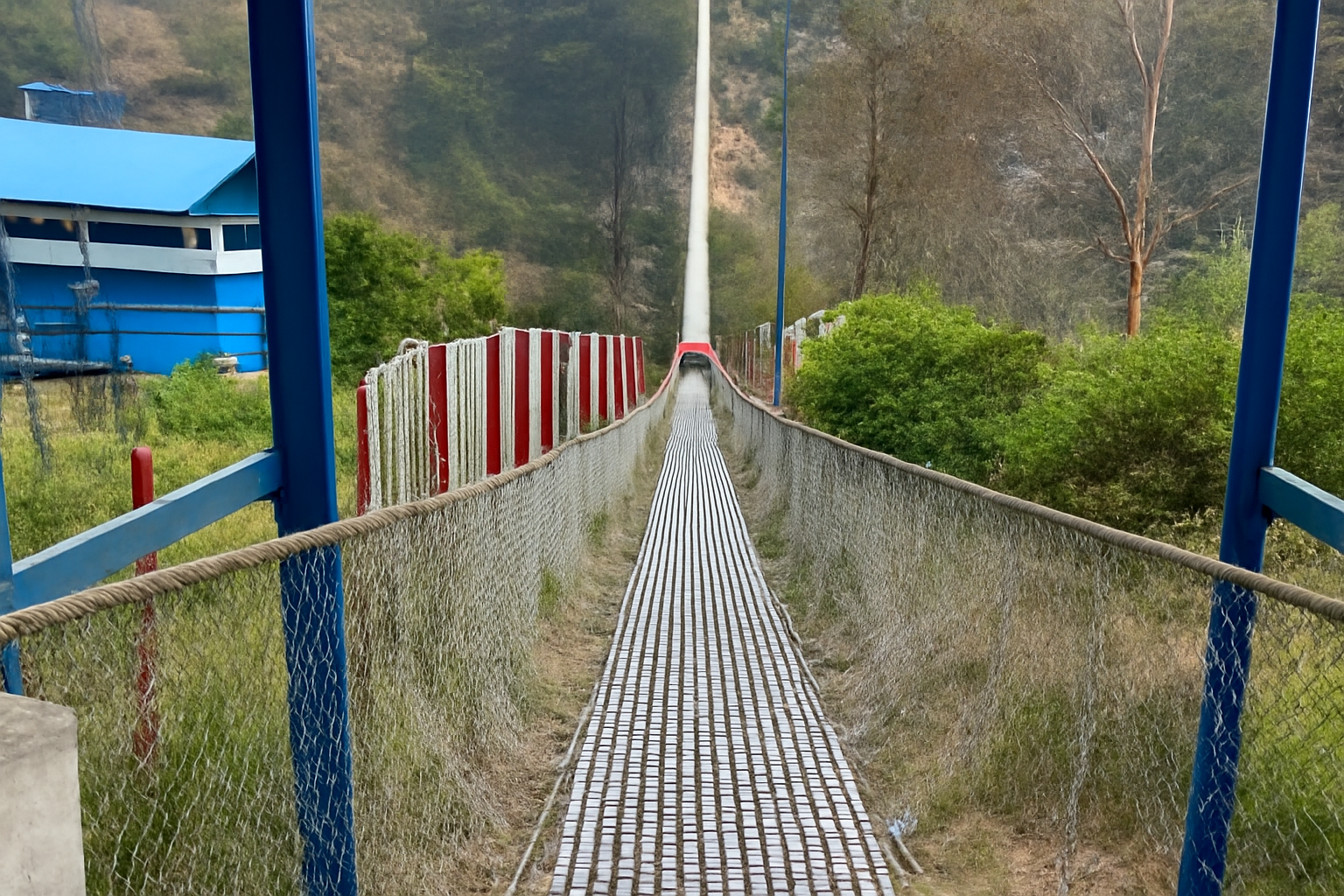
Combines civil engineering with rural development to uplift rural infrastructure, services, and livelihood through integrated solutions.
Seats: 48
Morning Program

Designed for diploma graduates to enhance expertise in sustainable infrastructure and smart civil engineering practices.
Seats: 48
Evening Program

A fusion of computer science and electronics, this program prepares students to innovate in software, hardware, and embedded systems.
Seats: 96
Morning Program

Covers power systems, generation, and transmission with a mix of electronics like circuits, embedded systems, and automation.
Seats: 48
Morning Program

Focused on electronic circuits, communication systems, networking, and the digital tech driving today's connected world.
Seats: 96
Morning Program

Seats: 150
Evening Program View Details
In Nepal, the Bachelor in Architecture (B.Arch) is a five-year program that integrates creative design, technical expertise, and cultural understanding. Unlike civil engineers, who focus primarily on structural integrity, architects are responsible for designing spaces that are not only functional and safe but also aesthetically pleasing and culturally significant. As Nepal modernizes, architects play a crucial role in balancing innovation with tradition, preserving the country’srich heritagewhile addressing modern challenges like sustainability and environmental resilience.
Architecture stands out by focusing on design, aesthetics, and spatial experience, balancing creativity with functionality. Architects envision how a space looks and feels, while civil engineers ensure structural and technical soundness. Architects prioritize flow, materials, sustainability, and user comfort in harmony with cultural and environmental contexts.
Notable alumni include Ar. Aman Kumar Maskey (Honorable Minister-Ministry of Physical Infrastrurue Development), Ar. Padma Kumar Mainali (Joint Secretory-Ministry of Urban Development), and Ar. Baburam Bhattarai (City Planning Commission, Kathmandu).
The Department of Architecture at NEC was established in 1996. In 2019, under Pokhara University, the curriculum was revised to include innovation, sustainability, and practical learning. The department has 18+ experienced faculty members and a strong alumni network.
Contact:
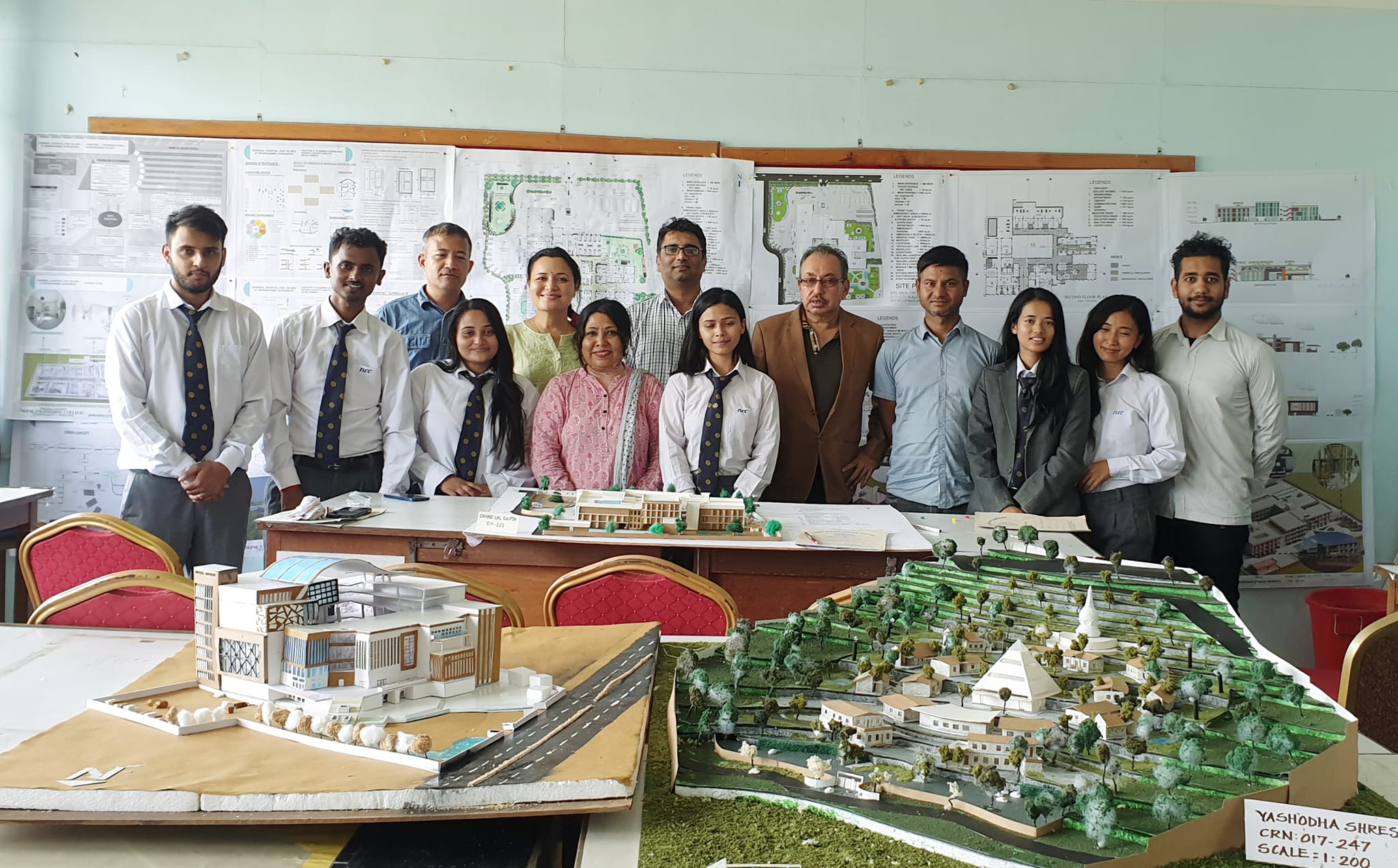
| Semester | Subjects | Total Credit |
|---|---|---|
| 1st | Mathematics, Introduction to Architecture, Building Materials, Free Hand Sketching, Basic Drafting, Basic Design | 18 |
| 2nd | Communication Techniques, Architectural Modeling, Architectural Independent Studies, Architectural Graphics, Design Studio-I, States and Dynamics | 16 |
| 3rd | History of Architecture I (Western & Eastern), Building Science I, Design Theory I, Structure I, Structural Forms, Computer Aided Design, Design Studio II | 19 |
| 4th | Building Construction I, History of Architecture II (Modern), Structure II, Surveying, Computer Aided 3D Visualizations, Design Studio III | 17 |
| 5th | Structure III, Building Construction II, Landscape Architecture, History of Architecture III (Nepalese), Elective I, Design Studio IV | 19 |
| 6th | Building Science II, Settlement Planning, Working Drawing and Detailing, Design Theory II, Building Services, Design Studio V | 17 |
| 7th | Practicum (Practical Office Experience) | 15 |
| 8th | Estimation, Valuation and Specification, Building Construction III, Elective II, Directed Studies and Seminar, Design Studio VI | 15 |
| 9th | Elective III, Architects & Society, Design Studio VII, Thesis: Part I | 15 |
| 10th | Professional Practice, Thesis: Part II | 14 |
| Total Credit | 165 | |
Have you ever wondered how the tallest skyscrapers, longest bridges or gigantic hydropower plants are made? Behind every structure around us, there is the meticulous planning and execution of Civil Engineers. Civil Engineering is mostly about designing, building, and maintaining the infrastructures that keep our world connected and moving. From constructing earthquake-resistant buildings to ensuring clean water reaches every home, Civil Engineers turn ideas into reality. If you dream of creating structures that stand the test of time and want a career that combines creativity, technology, and real-world impact — Civil Engineering is your path to shaping the future!
Civil Engineering offers several advantages, especially for students looking for diverse scope after a bachelor’s degree and a career with visible, long-lasting impact. One of the biggest strengths of Civil Engineering is its wide-ranging applications — from structural design, transportation, water supply, and environmental protection to urban development and disaster-resilient infrastructure. Unlike fields that may confine you to factories or coding rooms, Civil Engineers work in both outdoor project sites and technical offices, providing a dynamic and balanced work environment.
After a bachelor’s degree, Civil Engineering graduates enjoy diverse career options — pursuing higher studies in structural engineering, geotechnical engineering, construction management, environmental engineering, or even transitioning into entrepreneurship, urban planning, or public service. Civil Engineers are also in constant demand globally, as developing and maintaining infrastructure like roads, bridges, tunnels, water systems, and smart cities is essential for every nation.
Bachelor in Civil Engineering is being offered in Nepal Engineering College since its establishment in 1994. As one of the earliest engineering institutes, Nepal Engineering College has produced a large mass of civil engineers who are working as accomplished professionals and academicians all over the world.
Contact:

| Semester | Subjects | Total Credit |
|---|---|---|
| 1st |
Applied Chemistry, Applied Physics, Calculus I, Communication Techniques, Computer Programming, Engineering Drawing |
15 |
| 2nd |
Algebra and Geometry, Applied Mechanics, Electrical and
Electronics
Engineering, Civil Engineering Materials, Civil Engineering Workshop, Engineering Geology, Introduction to Energy Engineering |
18 |
| 3rd |
Building Technology, Calculus II, Fluid Mechanics, Numerical Methods, Strength of Materials, Surveying I |
16 |
| 4th |
Engineering Economics, Hydraulics, Probability and
Statistics, Soil Mechanics, Structural Analysis I, Surveying II |
17 |
| 5th |
Engineering Hydrology, Estimating and Valuation, Foundation
Engineering, Structural Analysis II, Transportation Engineering I, Water Supply Engineering |
18 |
| 6th |
Project I, Concrete Technology and Masonry Structure, Design of Steel and Timber Structure, Irrigation and Drainage Engineering, Sanitary Engineering, Survey Field Project, Transportation Engineering II |
20 |
| 7th |
Project II, Construction Project Management, Design of R.C.C. Structures, Engineering Professional Practice, Hydropower Engineering |
17 |
| 8th | Elective III, Internship | 9 |
| Total Credit | 130 | |
In Nepal, significant development challenges persist in rural areas due to rural poverty and a low quality of life. Technology, infrastructure, and services are closely interconnected, and together they have a positive impact on the rural economy and quality of life. This has led to a demand for technical professionals who can apply engineering and technology knowledge to rural development.
Civil Engineering course is a general type which has subjects like; Irrigation Engineering, Hydropower Engineering, Foundation Engineering, Surveying, Design of Reinforced Structures and Steel Structures and so on. On the other hand, the Civil and Rural Engineering course has been designed incorporating the contents of rural infrastructures and technology without reducing any content of Civil Engineering course. The graduates of Civil and Rural Engineering will have knowledge of rural roads, trail bridges, ropeway, renewable energy, farm structures, mechanization in farming and post harvest technology in addition to the knowledge of Civil Engineering graduates.
The graduates of Civil and Rural Engineering can compete with graduates of Civil Engineering in any sectors; governmental agencies, NGOs, INGOs, construction industry or consulting firms. The graduates of Civil and Rural Engineering will have relatively more knowledge in the areas of rural infrastructures and technology used in rural areas. So they are more suitable for agencies working in rural areas. There are many successful graduates who have competed in the Public Service Commission (Loksewa aayog), Nepal. One of our graduates has been working as Under Secretary (2nd Class officer - upa-sachiv) in the Department of Irrigation. Many graduates are working in the construction industry, INGOs, NGOs etc.
The first batch of Civil and Rural Engineering enrolled in 2008 AD in Nepal Engineering College. Nepal Engineering College was the first institute to initiate this course in order to produce cadres who are able to work in rural areas effectively. Back in 2008 AD the course was designed having nine semesters. In 2018 AD, Pokhara University also initiated this program. Till date only two institutes; Nepal Engineering College and Pokhara University, are offering this course. Till date there are about 300 licensed Civil and Rural Engineers.
Contact:
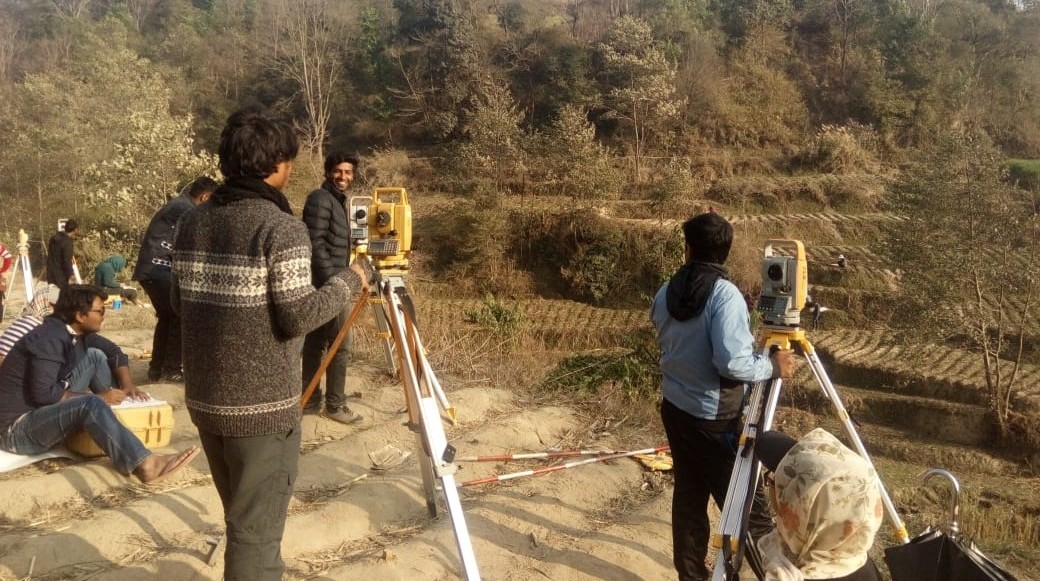

| Semester | Subjects | Total Credit |
|---|---|---|
| 1st |
Calculus I, Civil Engineering Materials, Basic Electrical and
Electronics Engineering, Introduction to Energy Engineering, Computer Programming, Communication Techniques, Civil Engineering Workshop |
16 |
| 2nd |
Algebra and Geometry, Applied Mechanics, Applied Physics, Building Technology, Applied Chemistry, Engineering Drawing |
16 |
| 3rd |
Calculus II, Statistics & Numerical Method, Fluid Mechanics, Strength of Materials, Surveying I, Engineering Geology |
18 |
| 4th |
Rural Infrastructure Engineering, Hydraulics, Structural
Analysis I, Surveying II, Soil Mechanics, Engineering Economics |
18 |
| 5th |
Engineering Hydrology, Structural Analysis II, Foundation
Engineering, Water Supply Engineering, Concrete Technology & Masonry Structure, Transportation Engineering I, Survey Field Project |
18 |
| 6th |
Estimating and Valuation, Sanitary Engineering, Design of R.C.C.
Structure, Transportation Engineering II, Irrigation and Drainage Engineering, Elective I, Rural Engineering Project I |
19 |
| 7th |
Hydropower Engineering, Design of Steel and Timber
Structure, Engineering Professional Practice, Construction Project Management, Elective II, Rural Engineering Project II |
17 |
| 8th | Elective III, Internship | 9 |
| Total Credit | 131 | |
Have you ever wondered how the tallest skyscrapers, longest bridges or gigantic hydropower plant are made? Behind every structure around us, there is the meticulous planning and execution of Civil Engineers. Civil Engineering is mostly about designing, building, and maintaining the infrastructures that keep our world connected and moving. From constructing earthquake-resistant buildings to ensuring clean water reaches every home, Civil Engineers turn ideas into reality. If you dream of creating structures that stand the test of time and want a career that combines creativity, technology, and real-world impact — Civil Engineering is your path to shaping the future!
Civil Engineering offers several advantages, especially for students looking for diverse scope after a bachelor’s degree and a career with visible, long-lasting impact. One of the biggest strengths of Civil Engineering is its wide-ranging applications — from structural design, transportation, water supply, and environmental protection to urban development and disaster-resilient infrastructure. Unlike fields that may confine you to factories or coding rooms, Civil Engineers work in both outdoor project sites and technical offices, providing a dynamic and balanced work environment.
After a bachelor’s degree, Civil Engineering graduates enjoy diverse career options — pursuing higher studies in structural engineering, geotechnical engineering, construction management, environmental engineering, or even transitioning into entrepreneurship, urban planning, or public service. Civil Engineers are also in constant demand globally, as developing and maintaining infrastructure like roads, bridges, tunnels, water systems, and smart cities is essential for every nation.
Nepal Engineering College (nec) has been offering a Bachelor's program in Civil Engineering for Diploma graduates since 2000, under the affiliation of Pokhara University. This program is specifically designed to cater to the nation's need for qualified engineers.
Nepal Engineering College - Bachelor Program for Diploma Holders (nec-BDH) serves as a dedicated center for offering Bachelor's programs tailored explicitly for Diploma engineering graduates. Situated in Prayagpokhari, nearby Lagankhel, Lalitpur, within the infrastructure of nec, the college enjoys excellent accessibility and transportation connectivity to all parts of Kathmandu, Lalitpur, and Bhaktapur, even during late evening hours. It has earned a reputation as the ultimate destination in Nepal for students pursuing professional technical education, particularly in the field of BE Civil for Diploma Holders.
Contact:

| Semester | Subjects | Total Credit |
|---|---|---|
| 1st |
Basic Engineering Mathematics, Basic Engineering Physics, Basic Engineering Chemistry, Basic of Computer and Programming, Communication Technique, Engineering Survey and Quantitative Technique |
16 |
| 2nd |
Calculus I, Applied Chemistry, Applied Physics, Computer Programming, Applied Mechanics, Civil Engineering Workshop |
16 |
| 3rd |
Algebra and Geometry, Civil Engineering Materials, Strength of
Materials, Advanced Surveying, Engineering Geology, Fluid Mechanics |
16 |
| 4th |
Calculus II, Mechanics of Materials, Hydraulics, Probability and Statistics, Basic Electrical and Electronics Engineering, Survey Project Work |
16 |
| 5th |
Numerical Methods, Water Supply Engineering, Engineering Hydrology, Soil Mechanics, Structural Analysis I |
13 |
| 6th |
Structural Analysis II, Sanitary Engineering, Concrete Technology and Masonry Structure, Elective I, Foundation Engineering |
13 |
| 7th |
Irrigation and Drainage Engineering, Design of Steel and Timber
Structures, Transportation Engineering I, Estimating and Valuation, Elective II |
15 |
| 8th |
Transportation Engineering II, Water Resource Engineering, Engineering Economics, Elective III, Structural Analysis III |
15 |
| 9th |
Engineering Professional Practice, Construction Project
Management, Final Project and Internship |
11 |
| Total Credit | 131 | |
Computer Engineering is a dynamic and interdisciplinary field that merges the principles of electrical, electronics engineering, and computer science to design, develop, and optimize both hardware and software systems. Unlike pure computer science, which focuses primarily on algorithms and programming, computer engineering bridges the gap between hardware components (like microprocessors, circuits, and embedded systems) and software applications (such as AI systems, cybersecurity protocols, and network infrastructures).
In Nepal’s context, where digital transformation is rapidly accelerating, computer engineers are vital in:
| Aspect | Computer Engineering (CE) | Information Technology (IT) |
|---|---|---|
| Core Focus | Designing and developing hardware + software systems (e.g., chips, robotics, IoT) | Managing and optimizing existing tech systems (e.g., networks, databases, cloud) |
| Key Skills | Circuit design, embedded systems, AI/ML hardware, Linux Kernel | Cloud computing, network administration, database management |
| Career Paths | Embedded Systems Engineer, Hardware Designer, Robotics Specialist | Cloud Architect, Cybersecurity Analyst, IT Consultant |
| Tools/Technologies | Arduino, VHDL, PCB Design, C/C++, Python | AWS/Azure, SQL, VPNs, Docker/Kubernetes |
| Math/Physics | Heavy emphasis (calculus, electronics) | Minimal (basic algorithms, statistics) |
| Best For | Students who enjoy building tech from scratch | Those who prefer applying tech in business/operations |
| Job Market (Nepal) | Growing in R&D and tech startups | High demand across all industries |
| Salary Range (Nepal) | NPR 600K–2M+/year (hardware/embedded roles) | NPR 500K–1.2M/year (cloud/network roles) |
Why Choose Computer Engineering?
• Ideal for students who enjoy both coding and electronics.
• Offers flexibility to work in startups, research labs, or multinational
corporations.
• Prepares students to contribute to both hardware innovation and software
development.
Notable Alumni:
• Duration: 4 years (8 semesters), affiliated with Pokhara
University.
• Revised Curriculum (2022): Focuses on artificial
intelligence,
cybersecurity, and Internet of Things (IoT) technologies.

| Semester | Subjects | Total Credit |
|---|---|---|
| 1st |
Basic Electrical Engineering, Calculus I, Communication
Techniques, Computer Workshop, Logic Design, Electronic Devices and Circuits, Programming in C |
18 |
| 2nd |
Algebra and Geometry, Applied Chemistry, Applied Physics, Basic Engineering Drawing, Data Structure and Algorithms, Instrumentation, Object Oriented Programming in C++ |
18 |
| 3rd |
Computer Graphics, Data Communication, Database Management
System, Microprocessor and ALP, Operating Systems |
15 |
| 4th |
Advanced Programming with Java, Applied Mathematics, Computer Architecture, Numerical Methods, Research Fundamentals, Theory of Computation |
18 |
| 5th |
Artificial Intelligence, Digital Signal Analysis and
Processing, Embedded System, Engineering Management, Probability and Statistics, Software Engineering |
18 |
| 6th |
Computer Networks, Compiler Design, Image Processing and Pattern
Recognition, Machine Learning, Simulation and Modeling, Elective I |
18 |
| 7th |
Cloud Computing and Virtualization, Data Science and
Analytics, Engineering Economics, Entrepreneurship and Professional Practice, Elective II, Ethical and Cyber Security |
18 |
| 8th | Internship, Project II, Final Project | 5 |
| Total Credit | 128 | |
Electrical and Electronics Engineering (EEE) focuses on the generation, transmission, and utilization of electrical energy. At nec, students gain expertise in power systems, control systems, renewable energy, high-voltage engineering, and embedded systems—equipping them to modernize Nepal’s power infrastructure and rural electrification.
While Electronics and Communication Engineering emphasizes communication systems, EEE focuses on power systems and electrical infrastructure. Students learn about power generation, electrical machines, smart grids, high-voltage systems, and control automation—blending traditional electrical knowledge with modern energy technologies.
Nepal Engineering College started this program in 2006 A.D. to address Nepal’s growing demand for qualified electrical engineers. The department blends strong theory with practical labs, internships, and research focused on smart grids and renewable energy.
Contact:

| Semester | Subjects | Total Credit |
|---|---|---|
| 1st |
Applied Physics, Basic Electrical Circuits, Calculus I, Computer Programming, Electrical Installation Practice & Safety, Basic Engineering Drawing, Engineering Workshop |
17 |
| 2nd |
Algebra and Geometry, Basic Mechanical Engineering,
Communication
Techniques, Electrical Engineering Material, Electronic Devices, Network Theory |
18 |
| 3rd |
Calculus II, Digital Logic, Electrical Machine I, Electromagnetic Fields and Waves, Electronic Circuits, Instrumentation |
18 |
| 4th |
Applied Mathematics, Control System, Electrical Machine II, Microprocessors, Numerical Methods, Transmission and Distribution Systems |
17 |
| 5th |
Control System Design, Electrical Machine Design, Engineering
Economics, Power Electronics, Power System Analysis, Signals and Systems |
17 |
| 6th |
Engineering Management, High Voltage Engineering, Elective
I, Probability and Statistics, Switch Gear and Protection, Utilization of Electrical Energy |
18 |
| 7th |
Modern Communication System, Elective II, Power Plant
Technology, Renewable Energy and Grid Integration, Research Methodology, Transmission and Distribution Design |
17 |
| 8th | Elective III, Internship, Major Project | 12 |
| Total Credit | 134 | |
Information & Communication Engineering (ICE) is an IT-driven engineering
discipline
that fuses computing, AI, and IoT with communication systems and electronics to
build
intelligent, connected products and services. You learn how to architect the
full
digital stack—sensing and embedded devices → wireless networks → cloud/edge
platforms →
data pipelines and AI/ML models—so real-world solutions are secure, reliable,
and
scalable.
With a strong software foundation (programming, databases, networking,
cloud/DevOps,
cybersecurity) and depth in AI/ML, data analytics, computer vision, and IoT
device-to-cloud integration, ICE prepares graduates to create smart applications
for
telecom, smart cities, healthcare tech, automation, and beyond. Learning is
reinforced
through hands-on projects, internships, specialized electives
(AI/Communication/IT/Biomedical), and non-credit upskilling in Python, MATLAB,
Arduino,
and microcontrollers.
Quick comparison
Outcome: Graduates are ready for roles like IoT/Embedded Engineer, AI/Edge Developer, Wireless/Network Engineer, Cloud-Networking/DevOps Engineer, Data/ML Engineer, and ICT Project Manager.
Typical job titles: Software Engineer • AI/ML Engineer • Data Scientist/Engineer • Embedded/IoT Engineer • Hardware/VLSI/FPGA Engineer • Cybersecurity Analyst • Cloud/DevOps Engineer • Network/RF Engineer • AR/VR Developer • Systems/Integration Engineer • ICT Project Manager.
Notable Alumni:

| Semester | Subjects | Total Credit |
|---|---|---|
| 1st |
Applied Physics,
Basic Electrical Circuits,
Engineering Mathematics I, Computer Programming, Digital Logic, Electronics Engineering Workshop |
16 |
| 2nd |
Engineering Mathematics II,
Electromagnetic Waves and Propagation,
Electronic Devices and Circuits, Communication Techniques, Object Oriented Programming with Java, Engineering Drawing |
15 |
| 3rd |
Engineering Mathematics III,
Data Structure and Algorithms,
Database Management System, Microprocessors and Computer Architecture, Instrumentation & Sensor Technology |
15 |
| 4th |
Signals and Systems,
Probability and Statistics,
Web Technology, Numerical Methods, Software Engineering, Engineering Economics |
17 |
| 5th |
Artificial Intelligence,
Communication System Engineering,
Digital Signal Processing, Embedded System, Mobile Application Development, Mini Project |
16 |
| 6th |
Data Communication,
Antenna Systems,
Cloud Computing and Virtualization, Internet of Things, Elective I, Minor Project |
16 |
| 7th |
Data Science and Machine Learning,
Wireless Communication Technology,
Entrepreneurship and Professional Practice, Engineering Management, Telecommunication and Network Security, Elective II |
16 |
| 8th | Elective III, Internship, Major Project | 9 |
| Total Credit | 120 | |
Contact:
01-5221012 (Office Hour only)
9741802096 (Call/Whatsapp/Viber)
Er. Rupesh Dahi Shrestha,Co-ordinator, Admission Committee 2025
Registration Charge: Rs. 1,000/-
Pay online via e-Sewa or Khalti